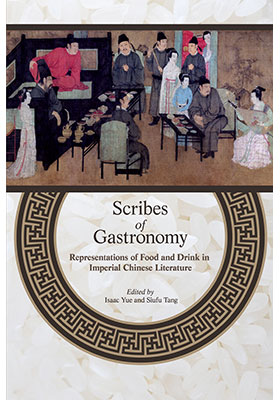Scribes of Gastronomy
Representations of Food and Drink in Imperial Chinese Literature
(臧否饕餮: 古代中國的飲食文學)
ISBN : 978-988-8139-98-9
July 2013
172 pages, 6″ x 9″
- HK$195.00
Ebooks
Also Available on
The culture of food and drink occupies a central role in the development of Chinese civilization, and the language of gastronomy has been a vital theme in a range of literary productions. From stanzas on food and wine in the Classics of Poetry to the articulation of refined dining in The Dream of the Red Chamber and Su Shi’s literary recipe for attaining culinary perfection, lavish textual representations help explain the unique appeal of food and its overwhelming cultural significance within Chinese society. These eight essays offer a colorful tour of Chinese gourmands whose work exemplifies the interrelationships of social and literary history surrounding food, with careful explication of such topics as the importance of tea in poetry, “the morality of drunkenness,” and food’s role in objectifying women.
“This collection of stimulating essays explores the centrality of food and foodways as a core theme in Chinese literary culture from Qin through Qing. Its focus on literary treatments of alcohol and tea across poetry and prose will be valuable to specialists and non-specialists alike.” —Roel Sterckx, author of Food, Sacrifice and Sagehood in Early China
“An erudite and timely examination of the centrality of food and drink as both substance and symbol in imperial China. The authors definitively establish gastronomy’s long-standing connections to moral, social and political discourse in Chinese literature and culture. An indispensable addition to the scholarship on food culture both inside and beyond China.” —Joanna Waley-Cohen, professor of history, New York University
“What shines through every one of the eight papers is a loving commitment to the subject of food and drink in literature, and the result is a charming and readable volume which punches above its weight in giving pleasure to the reader regardless of the extent of his/her own knowledge of the field.” —Journal of Chinese Studies
“As food writing emerges around the globe as a burgeoning field of critical inquiry from multiple perspectives—culinary, literary, social, and ecological—this edited volume of essays comes as a timely contribution from the Chinese world. As a much-needed survey of food writing in China throughout its long literary tradition, the book does well in lending support to, and indeed reinforcing, the idea that the culture of food and drink performs a central role in the development of Chinese civilisation.” —Luo Hui, New Zealand Journal of Asian Studies





